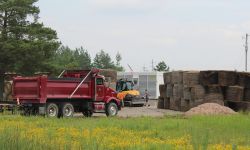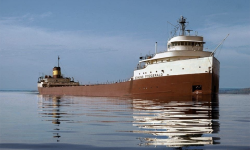Lawmakers try again to get $50M for controversial Copperwood mine in UP

- Upper Peninsula legislators seek $50 million to improve local infrastructure that would benefit a controversial copper mine
- The proposal comes after a similar economic development incentive stalled
- Local officials say the project would help the UP’s struggling economy, but environmental advocates oppose it
A trio of Upper Peninsula lawmakers are hoping to jump-start efforts to award $50 million in taxpayer money to support a proposed copper mine just outside Porcupine Mountains Wilderness State Park.
Rep. Greg Markkanen, R-Hancock, is seeking the grant to fund infrastructure improvements for Copperwood Mine. He submitted the request in April among nearly 800 earmark requests seeking $3.3 billion from the 2026 state budget.
Markkanen’s request would send $50 million to Wakefield Township in the western UP, about five hours west of the Mackinac Bridge. The improvements would support Highland Copper Co.’s efforts to open a $450 million mine.
Company projections say the copper mine will harvest at least $3.4 billion worth of the critical mineral used in power transmission and electronics, based on recent prices. That will make it profitable after two years of operations, according to the projections.
The grant proposal is celebrated by local officials and economic developers. However, the project is opposed by some legislators and environmental advocates who say the project could threaten the nearby Porcupine Mountains and Lake Superior.
Related:
- Michigan pauses $50M investment to bring back copper mining to Upper Peninsula
- Michigan approves $50M for Upper Peninsula copper mine — but with conditions
- Michigan lawmakers finalize $247M in state subsidies, minus copper mine money
- Michigan imposes new restrictions, testing requirements on UP copper mine
- Michigan lawmakers begin public pitches for earmarks under new transparency rule
The attempt to gain legislative funding approval follows so-far unsuccessful efforts to get the same funding passed as an economic development subsidy.
“Copperwood, at the end of the day, is one of the most advanced copper projects in the US. and it’s time to build it.,” Highland CEO Barry O’Shea told Canadian financial reporting website Stockhouse in an opinion interview published Thursday.
The project is proceeding with site work, he added, while the company pursues financing, reportedly $200 million in debt financing.
“Through 2025, we’ll be advancing our engineering, looking to de-risk and optimize the project, prepare ourselves for project financing, and ideally (making) a construction and decision in 2026,” O’Shea said.
Citing the project’s lack of investors, the Michigan Strategic Fund board hit pause on a $50 million request to support road improvements and other infrastructure changes in January 2024.
Highland Copper told the state that the project would result in 380 new jobs, with state projections saying it could result in $15 million in annual municipal and state tax revenue.
The western UP has struggled since the last major mining operation closed in the mid 1990s.
“America’s advanced manufacturing and national security depend on our ability to mine materials like copper locally. That’s why projects like Copperwood are so important to the future of the UP and our country,” said Marty Fittante, CEO of economic development group InvestUP, in a statement.
“For decades, the UP has proven that mining can be done safely while protecting the environment and creating jobs for the local community.”
Opponents remain unconvinced. Protect the Porkies, an environment group, has mobilized over the initiatives, getting 460,000 signatures on a petition against the mine.
"Subsidizing a foreign company to mine next to and underneath our most beloved old growth forest State Park, ship the copper to Canada, and leave behind a massive waste pile on topography sloping into Lake Superior is a move that defies common sense and is not aligned with Michigan interests,” leader Tom Grotewahl told Bridge.
The steep taxpayer-funded subsidy also has drawn attention from legislators who are increasingly skeptical of the value of economic development incentives. A recent Bridge analysis showed that despite promising $2.5 billion to private businesses for job-growth during Gov. Gretchen Whitmer’s terms, the incentives have only delivered 13,000 jobs.
“The mine doesn’t need a $50 million subsidy from taxpayers to get to the billions of dollars worth of copper underground,” state Sen. Jeff Irwin, D-Ann Arbor, told Bridge Michigan.
“The copper can’t threaten to pull up stakes and move South for lower wages like our automakers do.”
Shares of Highland Copper [HDRSF] traded at almost 8 cents on Thursday morning, giving the Canadian company a market value of $56 million.
The company’s most recent public filing, in December 2024, said that Highland has $54 million in assets and $14.4 million in cash.
Copperwood also received a new air quality permit in February from the Michigan Department of Environment, Great Lakes, and Energy, allowing the project to continue moving forward.
Public comment pushed the state’s Air Quality Division to place additional limits on the mine, including allowing tests by the state at any time, instead of just once.
Markkanen’s earmark request would address road upgrades, making County Road 519 available for year-round use. It also would increase power capacity and telecommunications performance across western Gogebic County.
Co-sponsors are Rep. Dave Prestin, R-Cedar River, R- and Rep. Karl Bohnak R-Marquette.
“While $50 million is requested, there is more than $100 million in infrastructure work to be completed,” according to Markkanen’s filing. “A public investment toward upgrades in the area will ensure private capital is attracted to the area to complete the remaining infrastructure work.”
The request now will be vetted by the House as it considers what one-time grants to add to its 2026 budget proposal.
Earmark requests are now public in the House ahead of the approval process, following transparency law changes. However, lawmakers have not said how they will review and rank proposals.
The one-time grants resulted in $1.4 billion in additional spending in 2023.
Business Watch
Covering the intersection of business and policy, and informing Michigan employers and workers on the long road back from coronavirus.
- About Business Watch
- Subscribe
- Share tips and questions with Bridge Business Editor Paula Gardner
Thanks to our Business Watch sponsors.
Support Bridge's nonprofit civic journalism. Donate today.
See what new members are saying about why they donated to Bridge Michigan:
- “In order for this information to be accurate and unbiased it must be underwritten by its readers, not by special interests.” - Larry S.
- “Not many other media sources report on the topics Bridge does.” - Susan B.
- “Your journalism is outstanding and rare these days.” - Mark S.
If you want to ensure the future of nonpartisan, nonprofit Michigan journalism, please become a member today. You, too, will be asked why you donated and maybe we'll feature your quote next time!




